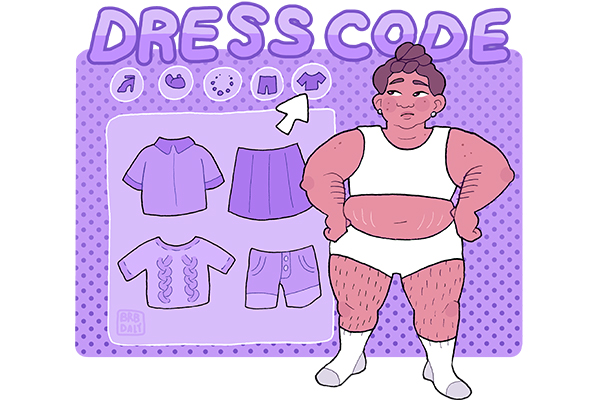Business undergraduates used to receive a handbook with a section devoted to business attire that split every category into men and women. Now, gender-related language is absent from that section.
Velma Arney, the senior director of BBA Career Services, said career services started removing the book’s “gendered language” in fall 2017 after LGBT and nonbinary students approached them. Arney said career services finished removing the language for this semester’s books and is open to further changes.
“We definitely recognized that we needed to make changes,” Arney said. “Students had been providing us with feedback, and we try as we see what’s happening in (the) industry and if we can make modifications.”
Claire Levinson, Gay Business Students Association president, said multiple members approached her during the group’s social earlier this semester about the handbook and asked her to contact career services.
“They brought up that concern of binary language in the handbook, saying we could easily make strides to improve this,” accounting junior Levinson said.
Levinson said association members received the handbook before its revisions in 2017. She said more changes could be made to the current handbook, such as adding more nonbinary stock photos to the attire section.
“At first, it basically said, ‘Men can wear this,’ ‘Women can wear this,’ and so on,” Levinson said. “It’s subjecting people to pick man versus woman when some are on a (gender) spectrum. It’s kind of like being excluded from the classroom. It’s like when someone uses the wrong pronouns. It makes you feel like you’re not the person you are.”
Levinson, a McCombs Student Diversity Committee member, said she contacted Leticia Acosta, director of BBA Diversity Inclusion and Outreach at McCombs, who shared the handbook’s progress with her.
Arney said she consults students through the McCombs Diversity Council whenever making the next semester’s handbook.
“As we are making changes, I like to run it by students,” Arney said. “We can’t give every page for feedback, but I work with the diversity council inclusion committee. That’s just where we’ve been able to connect with other people. It’s important for us to have that relationship with our students.”
Arney said she hosts a meeting with employers annually, and they said their industries have embraced different gender identities.
“We all identify in different ways, and that’s what we want to embrace,” Arney said. “In different ways, we feel comfortable. And that’s also what the industries — some more than others — are embracing. We want to send a message to the industries who are not, as well.”
Arney said she will continue to change the handbook as students bring up valid concerns to herself and coordinators like Acosta.
“We always want to support our students,” Acosta said. “Being (a mom), (I) want to make sure students feel like they can bring their whole selves to school. That’s what we try to build here on campus. All our students are different, and we want to celebrate them.”
Editor's Note: This article has been updated to correct the name of the McCombs Student Diversity Committee and quotes that were incorrectly attributed. The Texan regrets these errors.





















